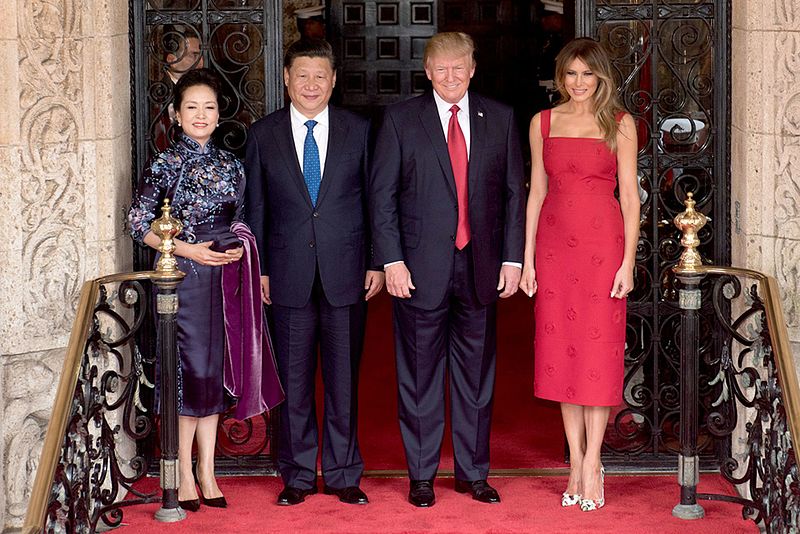Ruta de navegación
Menú de navegación
Blogs
Entries with Categories Global Affairs North America .
U.S.-China relations do not satisfy either country; They probably never will. They must try to deal with them, peacefully
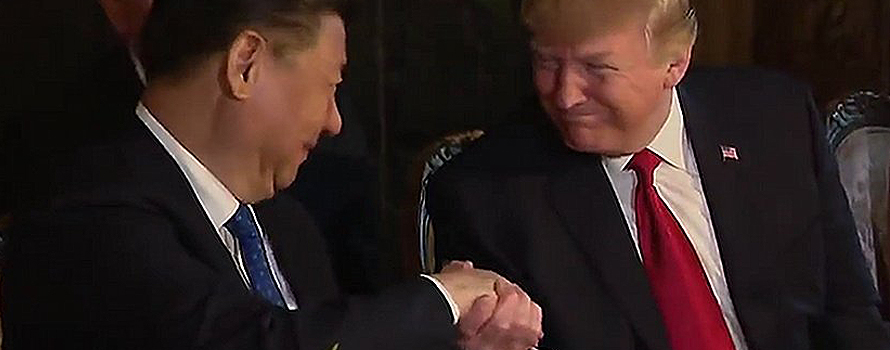
▲meeting between Xi Jinping and Donald Trump [White House video screebshot]
ANALYSIS / María Granados
The National Security Strategy presented in December by Donald Trump label China and Russia as "rivals" of the United States. It portrays those two countries as actors that "challenge the power, influence, and interests" of Washington and "attempt to erode the security and prosperity" of Americans. Although the document also considers "renegade" states such as Iran and North Korea, and transnational organizations, both jihadist and organized crime, a threat, the arguments of the new US administration are especially focused on China. The Asian nation appears as the great obstacle to the realization of the "America First" promised by Trump, because of its unfair trade and monetary practices.
Thus, the first National Security Strategy document of the Trump era corroborates the speech which he had maintained as candidate. During the election campaign, Trump spoke of China as a "currency manipulator" and accused it of artificially keeping the yuan low. He also threatened Beijing with starting a trade war, complaining about the economic consequences for the U.S. of China's excessive trade surplus in bilateral relations, as well as the reduction of jobs in U.S. manufacturing. Shortly after being elected, before the inauguration of his term, Trump provoked a diplomatic friction with China by talking by phone with the president of Taiwan.
However, since his arrival in the White House, Trump has been concerned with ironing out those rough edges with China. He pledged to uphold the One China Policy, retracted his criticisms, and met in Florida with President Xi Jinping, agreeing to respect each other's sphere of influence and not intervene in each other's internal affairs. This, along with an incipient partnership in the sanctions against North Korea, it seemed to be giving birth to a rapprochement that has not yet materialized. In fact, the U.S. National Security Strategy's official "rival" treatment of China somewhat breaks with a long period of mutual acceptance that began in the 1970s.
Nixon's Opening
The United States and China started from serious antecedents: the Korean War (1950-1953), which pitted China and the USSR in the North against the American-backed South, of which the Vietnam War (1955-1975) was a collateral consequence; and the nuclear danger that began in 1949, the year in which the USSR carried out the first nuclear war. essay effective. For Washington, from an ideological and military point of view, China was an international actor that should be controlled. For Beijing, in alliance with the Soviet Union, it was urgent to spread the speech communism about the "imperialist enemy," which he repeated with intensity throughout the early years of the Cold War.
In 1969, the new U.S. president, Richard Nixon, included in his speech inauguration of mandate one reference letter against isolationism (1). From the other side of the world there were also new messages: the distance that Mao began to establish in relation to the USSR due to its border conflicts. This upset the triangle of international relations that existed in those years of the Cold War (China, USSR, USA), and began to create a bond between Beijing and Washington.
In this way, the first signs of approximation began to appear. In 1971, the U.S. voted to allow Taiwan to join the committee of the United Nations Security Council will be occupied by the People's Republic of China. In 1972 the statement of Shanghai, which established the instructions for the Sino-American rapprochement and which was embodied in five principles:
1. The One China Policy: Establishing diplomatic relations with China meant not being able to establish them with Taiwan, and vice versa, since both claim to be the true and only China.
2. Not supporting Taiwan independence.
3. Do not support the possible invasion of Japan.
4. The peaceful resolution of the conflict with Taiwan, reducing military installations on the island.
5. A commitment to continue to be peaceful allies in the pursuit of lasting cooperation.
Since the rapprochement of the 1970s, relations between the two countries have been heavily influenced by Washington and Beijing's attitude toward Taiwan and the two Koreas, in a sort of indirect Sino-American relations.
|
▲meeting bilateral meeting at Mar-a-Lago, Florida, in April 2017 [White House] |
The Question of Taiwan
The self-styled Republic of China had been the main obstacle to the complete normalization of relations, as seen with the statement of Shanghai. Effective reunification by (mainland) China was prevented by U.S. troops.
After 1973 we find two important documents: the so-called Taiwan Relations Act, by which the United States recognized the island as before, but not that it was a sovereign nation, and the Taiwan Relations Act. statement Set (sometimes referred to as "Second statement of Shanghai"), drastically cutting arms sales to Taiwan. In 1979, Washington and Beijing exchanged ambassadors, and the Americans ceased formal diplomatic relations with Taiwan.
Around 1980, the policy advocated by the mainland Chinese government was "one country, two systems", offering Formosa the exceptionality of a different and economically independent political system, but being part of the one China. However, this formula did not meet the wishes of the twenty-third province for independence. By 1985, the island's government was firmly moving towards democracy (2).
In the late 1990s, Beijing threatened Taiwan with military exercises in surrounding waters, in which missiles were deployed, prompting a forceful response from the United States: sending two aircraft carrier battle groups to the region; In doing so, Washington showed a clear determination to protect the former ally because of its strategic importance.
The status The current situation remains complex. No direct ties have been established between China and its rebel province through messaging or telecommunications; Neither are postal or parcel shipments sent, nor is there a direct connection of flights. Face-to-face meetings between delegates have been infrequent and not very productive.
The North Korea Problem
The Democratic People's Republic of Korea, for its part, is a particularly critical point in Sino-American relations, which also affects South Korea and Japan, which in turn are allies of the United States. Pyongyang has already carried out six underground nuclear tests and continues its missile launches over the Sea of Japan.
China is North Korea's only ally: it is its biggest partner commercial and its main source of food and energy. Beijing has historically opposed tough international sanctions against its neighbor. The will to survive communism is essential when it comes to understanding the close relationship between the sui generis Korean dictatorship and China. It's easy to guess why: if Kim Jong-Un's regime falls, Xi Jinping's could be destabilized. A refugee crisis, with thousands of North Koreans crossing the 1,400-kilometer border bordering the two countries, would have serious effects on the Asian giant. Although they remain strongly linked to Pyongyang, the Chinese have pushed for the resumption of the Six Dialogue and have accepted the application of certain international sanctions.
Trump's blunt assertion that "if China isn't going to solve the North Korea problem, we will" doesn't really dispel doubts about what might happen if Pyongyang crosses the threshold of nuclear capability. Certainly, as the Kim Jong-Un regime has approached that threshold, Beijing has increased its diplomatic, financial and commercial pressures on its neighbor (3). But the possibility that North Korea is already on the verge of reaching its goal The strategic strategy leaves the United States faced with the dilemma of military action, which can hardly be both effective and limited, or having to settle for a policy of containment.
Over the years, Washington has tried to encourage North Korea to irreversibly forget its nuclear program, proposing in return a reward consisting of financial aid, diplomatic advantages and the normalization of relations. At the same time, South Korea hosts 29,000 U.S. military personnel. In March 2017, executive orders from the President and the congress The U.S. government went beyond sanctions: a defense system known as THAAD (Terminal High Altitude Area Defense) (4) was programmed as a preventive measure against a possible attack by the North and with the aim of protecting the environment. goal to ensure the stability of the region.
The THAAD battery is particularly interesting to analyze, because of the double perspective it presents. Their limited range and capability should not worry China, as the interceptors would not be able to hit Chinese intercontinental ballistic missiles at any point in their trajectory, from almost any of the possible launch locations. As such, neither Washington nor Seoul should present the system as a form of retaliation against Beijing for its failed sanctions on North Korea. Unfortunately, U.S. and South Korean officials suggest that the purpose of the installation of the THADD system is to send a warning message to China. This is somewhat counterproductive, since it only offers reasons to justify the nuclearization of the Asian hegemon, in the face of the apparent degradation of its medium-range technology, that of the second Degree nuclear response (second-strike capability).
Mutual dissatisfactions
If the issues of Taiwan and North Korea have occupied a large part of the diary In the bilateral relationship, the issue of China's economic transformation, since its impetus by Deng Xiaoping, has been central to the direct relationship between China and the United States.
Gǎigé kāifàng (reform and opening-up) emphasized modernization and economic and political reform. This led to normalized diplomatic relations and thedevelopment bilateral trade and investment. Cooperation in subject The political, economic and security relations with the former "American imperialists" were based on the prevention of terrorism and the proliferation of nuclear weapons, and the maintenance of peace on the Korean peninsula.
However, there are still unresolved issues. U.S. dissatisfaction stems from China's human rights policy and its financial moves to devalue the currency as a measure to control inflation. These monetary movements call into question the control of the market by the American hegemon, which currently has greater weight and primacy, among other things, because the dollar is the international currency of exchange (it could thus "export its inflation" to Beijing). Washington is also concerned about the U.S.'s dependence on imports from China, which creates a large bilateral trade deficit for Americans. Another potential problem is the sale of missiles and nuclear technology to third States in the Middle East and Asia.
From the Chinese perspective, their dissatisfaction is due to the U.S. arms sales to the rebel province (Taiwan), the defense system established in South Korea (both the THAAD system and the U.S. government). financial aid and a U.S. foreign policy that Beijing dismisses as threatening, imperialist and domineering.
Ways of cooperation
The U.S. consideration of China as a "rival," as stated in the Trump Administration's first National Defense Strategy document, is based on the realization that the Chinese regime is not moving towards democracy as many in the rest of the world had hoped. "For decades, U.S. policy was based on the belief that support for China's rise and its integration into the post-war international order would liberalize China," the document says, noting that Beijing is not sliding toward a regime of political freedoms and respect for human rights, so Washington can no longer be as condescending to Beijing as it once was.
Probably, without China's assumption of the values and principles that give meaning to the United States, a real and confident rapprochement between the two superpowers is impossible. Still, for the survival of both, broad cooperation between them is necessary.
Although a war between the United States and China is not impossible, it is unlikely for a number of reasons, as Steinberg and O'Hanlon argue in Strategic Reassurance and Resolve (2015):
–The common objectives of economic prosperity, the exchange In terms of trade, interdependence, both at the stock market, financial and business levels, make a military confrontation very harmful to both countries. In addition, China has progressively adopted measures against fraud and destabilization by computer manipulation, at the behest of the United States; The issue of cyberespionage, although it continues to provoke mutual disagreements, is regularly addressed by both countries in their bilateral meetings, aware that it is likely to become more important over the years.
The South China Sea is a trade route that has never been closed, although it is a source of dispute to be taken into account, since they remain unresolved even though they have been brought before the Court dealing with the Law of the Sea (following the United Nations Convention on the Sea). The United States has strategic and commercial interests in the region that link it to its allies (Japan and South Korea), so it could be a source of tensions. In any case, it does not currently appear that China wishes to provoke a military escalation in the area, although it has established instructions on artificial islands and moved troops.
The ASEAN code of conduct for the South China Sea, which prevents the use of force, may cause Beijing to rethink increasing its aggressiveness in the region. That push by ASEAN for China to stop claiming maritime sovereignty that has been rejected by the international community are points against the war.
There are a number of joint counter-terrorism (ISIS) and anti-piracy operations involving the two superpowers.
China has increased its financial aid and its work in support of UN peacekeeping missions.
Faced with a scenario of no understanding between Beijing and Washington, but at the same time of no armed confrontation, the following actions should be suggested:
A negotiation that would include fewer arms sales to Taiwan by the US in exchange for greater security on the coasts, and a proportional reduction by China of threats to the island.
–Greater cooperation and transparency in the conduct of arms and troop movements, militarization, restructuring of the armed forces, and military exercises in the Pacific.
–Creation of joint organisations to combat organised crime and cyber-attacks, in particular threats to civilian infrastructure.
- Support and coherence in the prevention of nuclear escalation. Negotiation to reach a firm conclusion on how to weaken the Pyongyang regime. Serious and coherent criticism, knowing the impossibility (as well as harm) of its direct overthrow.
-----------------------------------------
(1) "We seek an open world--open to ideas, open to the exchange of goods and people--a world in which no people, great or small, will live in angry isolation.
We cannot expect to make everyone our friend, but we can try to make no one our enemy". Inaugural Adress (January 20, 1969)
(2) It was the first time that the Democratic Progressive Party succeeded in pressing the elections to the National Assembly and the Legislative Yuan and forming a unified coalition against the Kuomintang. In 1992, the first free legislative elections were held in Taiwan.
(3) "China will be most likely to put diplomatic and financial pressure on North Korea if it believes that failing to do so will lead the United States to destabilize the regime," write Joshua Stanton, Sung- Yoon Lee, and Bruce Klingner in Foreign Affairs.
(4) The system typically has between 48 and 62 interceptor missiles with ranges of up to 200 kilometers, supported by radar with a range of up to about 1,000 kilometers
[Admiral James Stavridis, Sea Power. The History and Geopolitics of the World's Oceans. Penguin Press. New York City, 2017. 363 pages]
review / Iñigo Bronte Barea [English version].
In the era of globalisation and its communication society, where everything is closer and distances seem to fade away, the body of water between continents has not lost the strategic value it has always had. Historically, the seas have been both a channel for human development and instruments of geopolitical domination. It is no coincidence that the great world powers of the last 200 years have themselves been great naval powers. The dispute over maritime space is still going on today and there is nothing to suggest that the geopolitics of the seas will cease to be crucial in the future.
These principles on the importance of maritime powers have changed little since they were set out in the late 19th century by Alfred T. Mahan. Today, Sea Power. The History and Geopolitics of the World's Oceans, by Admiral James G. Stavridis, who retired in 2013 after leading the US Southern Command, the US European Command and the supreme command of NATO.
The book is the fruit of Mahan's early reading and an extensive degree program of nearly four decades on the seas and oceans with the US Navy. At the beginning of each explanation of the different sea spaces, Stavridis recounts his brief experience in that sea or ocean, then continues with the history, and the development they have had, until arriving at their current context. Finally, there is a projection of the near future of the world from the perspective of marine geopolitics.
Pacific: China's emergence
Admiral J.G. Stavridis begins his voyage in the Pacific Ocean, which he categorises as "the mother of all oceans" because of its immensity, since it alone is larger than the entire land surface of the planet combined. Another remarkable point is that in its vastness there is no considerable landmass, although there are islands all over the world subject, with very diverse cultures. This is why the sea dominates the geography of the Pacific like nowhere else on the planet.
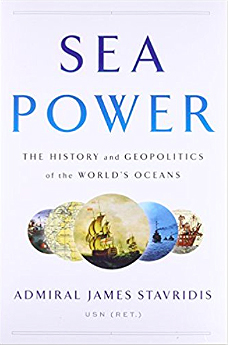 |
The great dominator of this marine space is Australia, which is very much aware of what might happen politically in the island archipelagos in its vicinity. It was Europeans, however, who explored the Pacific well (Magellan was the first, around 1500) and tried to connect it with their world in a way that was not merely transitory and commercial, but stable and lasting.
The United States began its presence in the Pacific with the acquisition of California (1840), but it was not until the annexation of Hawaii (1898) that the huge country was definitively catapulted into the Pacific. The first time this ocean emerged as a total war zone was in 1941 when Pearl Harbour was massacred by the Japanese.
With the return of peace, the Japanese revival and the emergence of China, Taiwan, Korea, Singapore and Hong Kong caused trans-Pacific trade to overtake the Atlantic for the first time in the 1980s, and this trend is still continuing. This is because the Pacific region contains the world's major powers on its shores.
degree program At area geopolitics a major arms race is taking place in the Pacific, with North Korea as a major focus of global tension and uncertainty.
Atlantic: from the Panama Canal to NATO
As for the Atlantic Ocean, Stavridis refers to it as the cradle of civilisation, since the Mediterranean is included among its territories, and even more so if we consider it as the nexus between the peoples of the Americas and Africa and Europe. It has two great seas of great historical importance, the Caribbean and the Mediterranean.
Undoubtedly the historical figure of this ocean is Christopher Columbus, since his arrival in America (Bahamas 1492) initiated a new historical period that ended with practically the entire American continent being colonised by the European powers in the following centuries. While Portugal and Spain concentrated on the Caribbean and South America, the British and the French concentrated on North America.
During the First World War, the Atlantic became an essential transit zone for the war development as the United States transported troops, war materials and goods to Europe during the conflict. It was here that the idea of an Atlantic community began to take shape, leading to the creation of NATO.
As for the Caribbean, the author sees it as a region that is rooted in the past. Its colonisation was characterised by the arrival of slaves to exploit the region's natural resources for purposes of economic interest to the Spanish. In turn, this process was characterised by the desire to convert the indigenous population to Christianity.
The Panama Canal is a driving force for the region's Economics , but Central America is also sailing along the coasts of the countries with the highest violence fees on the planet. Admiral Stavridis sees the Caribbean coast as a kind of Wild West, which in some places has evolved little since the days of pirates, and where drug cartels now operate with impunity.
Since the 1820s, with the Monroe Doctrine, the United States carried out a series of interventions through its navy to bolster regional stability and keep Europeans out of places such as Haiti, the Dominican Republic and Central America. In the 20th century, politics was dominated by caudillos, and soon communism and the Cold War came with them to the Caribbean, with Cuba as ground zero.
Indian Ocean and Arctic: from unknown to risky
The Indian Ocean has less history and geopolitics than the other two great oceans. Despite this, its tributary seas have gained geopolitical importance in the post-World War II era with the rise of global shipping and the export of oil from the Gulf region. The Indian Ocean today could be seen as a region for wielding smart power rather than hard power. While the slave trade and piracy have dwindled almost everywhere, they are still present in parts of the Indian Ocean. It is a region where countries around the world could work together to combat these common problems.
The history of the Indian Ocean does not inspire confidence about the potential for peaceful governance in the years to come. An important core topic to unlock the region's potential would be to resolve the existing conflicts between India and Pakistan (a conflict with the risk of nuclear weapons) and the Shia-Sunni divide in the Persian Gulf, issues that make it a very volatile region. Due to tensions in the Gulf countries, the region is today a kind of cold war between the Sunnis, led by Saudi Arabia, and the Shiites, led by Iran, and between these two sides, the United States, with its Fifth Fleet, is at the centre.
Finally, the Arctic is currently an unknown quantity. Stavridis sees it as both a promise and a danger. Over the centuries, all oceans and seas have been the site of epic battles and discoveries, but there is one exception: the Arctic Ocean.
It seems clear that this exceptionality is coming to an end. The Arctic is an emerging maritime frontier with increasing human activity, rapidly melting ice shelves and significant hydrocarbon resources coming within reach. However, there are major risks that will dangerously condition the exploitation of this region, such as weather conditions, unclear governance due to the confluence of five bordering countries (Russia, Norway, Canada, the United States and Denmark), and geopolitical competition between NATO and Russia, whose relations have deteriorated in recent years.
Continental U.S. neighbors are having a hard time interpreting the first year of the new Administration.
Donald Trump arrives at his first anniversary as president having set some recent fires in Latin America. His rude disregard for El Salvador and Haiti, due to the volume of refugees welcomed in the United States, and his intemperate attention to Colombia for the increase in cocaine production worsen relations that, although already complicated in the case of Mexico, have had some good moments throughout the year, such as the dinner of presidents that Trump convened in September in New York in which a united action on Venezuela was outlined.
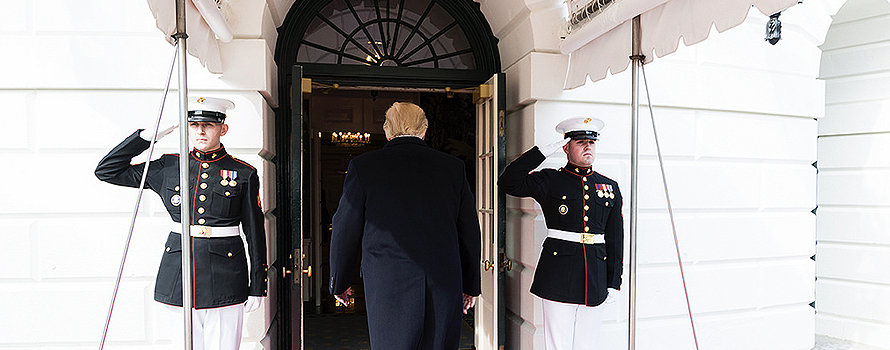
▲Trump, on completing 100 days as president [White House].
article / Garhem O. Padilla [English version].
One year after the arrival of the 45th President of the United States of America, Donald John Trump, to the White House -the inauguration ceremony was on January 20-, controversy dominates the balance of the new Administration, both in its domestic and international performance. The continental neighbors of the U.S., in particular, show bewilderment over Trump's policies toward the hemisphere. On the one hand, they regret the U.S. disinterest in commitments to economicdevelopment and multilateral integration; on the other, they note some activity in relation to some regional problems, such as Venezuela. The balance for the moment is mixed, although there is unanimous agreement that Trump's language and many of his manners rather threaten relations.
From TPP to NAFTA
agreement In the economic field, the Trump era began with the withdrawal final of the United States from the Trans-Pacific Partnership (TPP) on January 23, 2017. This made it impossible for entrance to enter into force, as the United States is the market for which the TPP was created agreement, which has affected the prospects of the Latin American countries that participated in the initiative.
The renegotiation of the North American Free Trade Agreement (NAFTA), demanded by Trump, was immediately opened. Doubts about the future of NAFTA, signed in 1994 and which Trump has described as a "disaster", have been prominent so far in his administration. Some of his demands, which Mexico and Canada oppose, are to increase the quota for products manufactured in the United States and the "sunset" clause, which would oblige the treaty to be reviewed methodically every five years and would cause it to be suspended if any of its three members were not in agreement with agreement. All of this stems from the U.S. president's idea of fail the treaty if it is not favorable to his country.
Cuba and Venezuela
If the quarrels with Mexico have not yet reached a conclusion, in the case of Cuba Trump has already retaliated against the Castro regime, with the expulsion in October of 15 Cuban diplomats from the Cuban embassy in Washington as a response to the "sonic attacks" that affected 24 U.S. diplomats on the island. The White House has also reversed some of the Obama Administration's conciliatory measures, when it realized that Castroism is not responding with openness concessions.
As far as Venezuela is concerned, Trump has made forceful efforts to introduce measures and sanctions against corrupt officials, in addition to addressing the political status with other countries, so that they support those efforts aimed at eradicating the Venezuelan crisis, thus generating multilateralism among American countries. However, this policy has its detractors, who believe that the sanctions are not intended to achieve a long-term goal deadline , and it is unclear how they would promote Venezuelan stability.
Although in these actions on Cuba and Venezuela Trump has alluded to the democratic principles violated by the rulers of Havana and Caracas, his Administration has not particularly insisted on the commitment to human rights, democracy and moral values, as had been usual in the argumentation of U.S. foreign policy. Some critics point out that the Trump Administration is willing to promote human rights only when they fit its political objectives.
This could explain the worsening opinion in Latin America about the United States and relations with that country. From agreement with the survey Latinobarómetro 2017, the favorable opinion has fallen to 67%, seven points below the one at the end of the Obama Administration, which was 74%. Said survey sample a relevant difference for Mexico, one of the countries that, without a doubt, has the worst levels of favorable opinion towards the Trump Administration: in 2017 it was 48%, a drop of 29 points compared to 2016, when it was 77%.
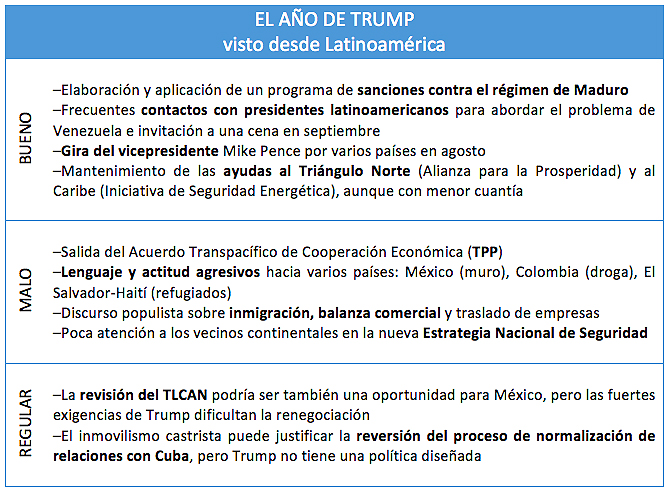 |
Immigration, withdrawal, decline
The restrictive immigration policies applied would also explain the rejection of the Trump Administration by Latin American public opinion. In the immigration section the most recent is the decision not to renew the authorization to stay in the United States of thousands of Salvadorans and Haitians, who once arrived fleeing calamities in their countries.
It is also worth mentioning Trump's efforts to achieve one of his main objectives since the beginning of his political campaign: to build a border wall with Mexico. The U.S. president has not been very successful so far in this goal, since despite having sought ways to finance it, what he has managed to introduce in the budgets is very insignificant in relation to the estimated costs. On the other hand, his decision
Trump's protectionism entails a retreat that may be accentuating the decline of the United States as a leader in Latin America, especially vis-à-vis other powers. China has been increasing its economic and political engagement in countries such as Argentina, Brazil, Chile, Peru and Venezuela. Russia, for its part, has strengthened its diplomatic and security relations with Cuba. It could be said that, taking advantage of the conflicts between the island and the United States, Moscow has sought to keep it in its orbit through a series of investments.
Security threats
This leads us to mention the new US National Security Strategy, announced in December. The document, presented by Trump, addresses the rivalry with China and Russia, and also refers to challenge the Cuban and Venezuelan regimes, for the alleged security threats they pose and the Russian support they receive. Trump expressed a strong desire to see Cuba and Venezuela join in "shared freedom and prosperity" and called to "isolate governments that refuse to act as responsible partners in advancing hemispheric peace and prosperity."
Similarly, the new U.S. Security Strategy alludes to other challenges in the region, such as transnational criminal organizations, which impede the stability of Central American countries, especially Honduras, Guatemala and El Salvador. However, the document devotes only one page to Latin America, in line with Washington's traditional focus on the areas of the world that most affect its interests and security.
An opportunity for the United States to get closer to Latin American countries will be the Summit of the Americas, to be held next March in Lima. However, nothing is predictable given the President's characteristic attitude, which leaves a great deal of room for possible surprises.
[Graham Allison, Destined for War. Can America and China Escape Thucydides's Trap? Houghton Mifflin Harcourt. Boston, 2017. 364 pages]
This is what has been called Thucydides' trap: the dilemma faced by a hegemonic power and a rising power that threatens that hegemony. Is war inevitable? When Thucydides narrated the Peloponnesian War, he wrote about the inevitability for domineering Sparta and the emerging Athens of thinking of armed confrontation as a means of settling conflict.
The fact that these two Greek polises necessarily thought about war, and eventually came to it, does not mean that they had no other options. History has shown that there are: when Wilhelmine Germany threatened to outwhelm Britain's naval strength, the attempt at sorpasso (accompanied by various circumstances) led to World War I, but when Portugal was overtaken by Spain in overseas possessions in the sixteenth century, or when the United States replaced Great Britain as the world's leading power at the end of the nineteenth century, the transfer was peaceful.
The call to Washington and Beijing to do everything possible not to fall into the trap described by the Greek historian is made by Graham Allison in Destined for War. Can America and China Escape Thucydides's Trap? The Dean The founder of Harvard's Kennedy School of Government reviews several historical precedents in his book. The Belfer Center for Science and International Affairs at the same university, where Allison is a member, has researched them director, in a program called Thucydides's Trap.
This concept is defined by Allison as "the strong structural stress caused when an emerging power threatens to unseat a reigning power. In such a status, not only extraordinary or unexpected events, but even ordinary flashpoints in international affairs can trigger large-scale conflicts."
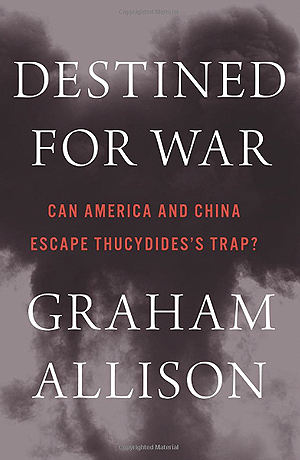 |
This structural stress is produced by the clash of two profound sensitivities: the emerging power syndrome ("the reinforced sense that an emerging state has of itself, its interests, and its right to recognition and respect"), and its inverse image, the reigning power syndrome ("the established power exhibits a growing sense of fear and insecurity as it faces signs of decline").
Along with the syndromes, both rival powers also experience a security dilemma: "A rising power may disregard the fear and insecurity of a ruling state because it knows that it itself is well-intentioned. Meanwhile, his opponent misinterprets even positive initiatives, taking them as excessively demanding or even threatening."
The use of military force
Allison starts from the fact that China is already catching up with the United States as a power. It has done so in terms of the volume of its Economics (China has already surpassed the U.S. in purchasing power parity) and in relation to some aspects of military strength (a report Rand Corporation predicted that by 2017 China would have "advantage" or "approximate parity" in 6 of the 9 conventional capacity areas. The author's assumption is that China will soon be in a position to wrest the scepter of the greatest superpower from the United States. Arrived before this status, how will both countries react?
In the case of China, its millennial outlook will likely lead to an attitude of patience, as long as there is some small progress in its development. purpose to increase its global specific weight. Since 1949, China has only resorted to force in three of 33 territorial disputes. In those cases, China's leaders waged war – limited wars, conceived as notice to their opponents – even though the enemy was equal or greater, urged by a status of domestic unrest.
For Allison, "as long as events in the South China Sea generally move in China's favor, it seems unlikely that China will use military force. But the trends in the balance of power were to turn against it, particularly at a time of internal political instability, China would initiate a limited military conflict, against an even larger and more powerful state like the United States."
For its part, the United States can choose several strategies, according to Allison: adapt to the new reality, undermine Chinese power (trade war, foment provincial separatism), negotiate a lasting peace, and redefine the relationship. The author does not give a committee firm, but it seems to suggest that Washington should move between the latter two options.
Thus, he recalls how Britain understood that it could not rival the United States in the Western Hemisphere, and how from there a partnership between the two countries, manifested in the First and Second World Wars. That would have to involve accepting that the South China Sea is a area of Chinese influence. And this is not out of mere condescension, but because the United States is proceeding with a real clarification of its vital interests.
Despite its positive tone, Destined for War is one of the essays of the American establishment where the end of the American era and the passing of the baton to China are most openly announced (it does not seem to envision a multipolar or bipolar world, but rather one of primacy of the Asian power). He is also one of the least emphasises – less, of course, than he should – on the strengths that the United States maintains and the problems that could undermine China's coronation.
Showing the range 51 - 54 of 54 results.

